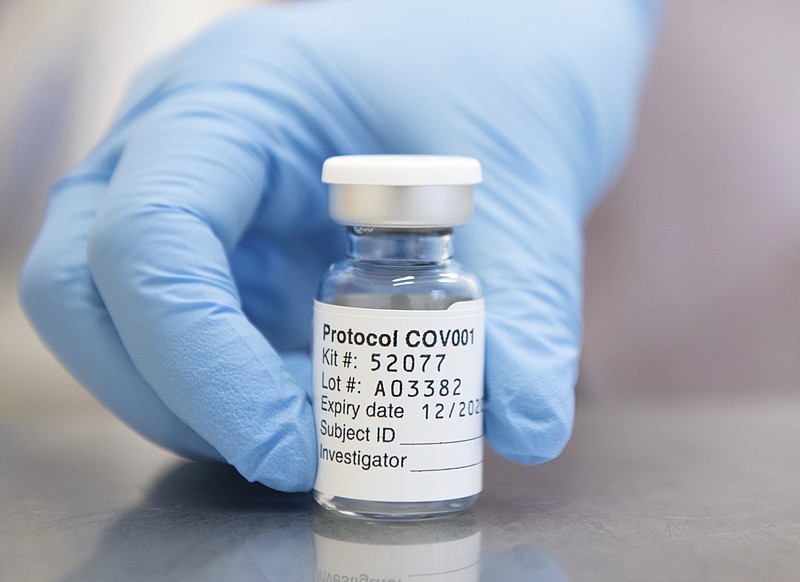LONDON -- With major covid-19 vaccines showing high levels of protection, British officials are cautiously optimistic that life will start returning to normal by early April.
Even before regulators have approved a single vaccine, the U.K. and countries across Europe are moving quickly to organize the distribution and delivery systems needed to inoculate millions of citizens.
"If we can roll it out at a good lick ... then with a favorable wind, this is entirely hypothetical, but we should be able to inoculate, I believe on the evidence I'm seeing, the vast majority of the people who need the most protection by Easter," Prime Minister Boris Johnson said Monday after vaccine-makers in recent weeks have announced encouraging results. "That will make a very substantial change to where we are at the moment."
The U.K. has recorded more than 55,000 deaths linked to covid-19, the deadliest outbreak in Europe. The pandemic has prevented families from meeting, put 750,000 people out of work and devastated businesses that were forced to shut as authorities tried to control the spread. England's second national lockdown is set to end Dec. 2, but many restrictions will remain in place.
[CORONAVIRUS: Click here for our complete coverage » arkansasonline.com/coronavirus]
The British government has agreed to purchase up to 355 million doses of vaccine from seven different producers, as it prepares to vaccinate as many of the country's 67 million people as possible. Governments around the world are setting agreements with multiple developers to ensure they lock in delivery of the products that are ultimately approved by regulators.
The National Health Service is making plans to administer 88.5 million vaccine doses throughout England, according to a planning document dated Nov. 13. Scotland, Wales and Northern Ireland are developing their own plans under the U.K.'s system of devolved administration.
Other European countries are also getting ready, as are the companies that will be crucial to the rollout.
For example, Germany's Binder, which makes specialized cooling equipment for laboratories, has ramped up production of refrigerated containers needed to transport some of the vaccines under development. Binder is producing a unit that will reach the ultra-cold temperatures needed to ship the Pfizer vaccine.
The German government has asked regional authorities to get special vaccination centers ready by mid-December. France, meanwhile, has reserved 90 million vaccine doses but has not yet laid out its plan for mass vaccination. A government spokesman said last week that authorities were working to identify locations for vaccination centers, choose companies to transport vaccines and set the rules for shipping and storage.
In Spain, health workers will get priority, as will residents of elder-care homes. Spain hopes to vaccinate some 2.5 million people in the first stage between January and March and have most of the vulnerable population covered by mid-year. The vaccinations will be administered in 13,000 public health centers.
Drugmakers must ramp up production so there is enough supply to vaccinate billions of people in a matter of months. Then they have to overcome distribution hurdles such as storing some of the products at ultra-cold temperatures. Finally, they will need to manage complex supply chains reminiscent of the just-in-time delivery systems carmakers use to keep their factories humming.
Vaccines from three drugmakers are considered leading candidates. Pfizer and Moderna have released preliminary data showing their vaccines were about 95% effective. AstraZeneca on Monday reported interim results of its vaccine, developed with Oxford researchers, that were also encouraging. Dozens of other vaccines are under development, including projects in China and Russia.
Meanwhile, German Chancellor Angela Merkel and the country's 16 state governors on Wednesday agreed to extend a partial shutdown well into December in an effort to further reduce the rate of covid-19 infections ahead of the Christmas period.
Germany embarked on a shutdown on Nov. 2, closing restaurants, bars, sports and leisure facilities but leaving schools, shops and hair salons open. It was initially set to last four weeks.
Merkel said the measures will now be extended until at least Dec. 20, with a goal of pushing the number of new coronavirus cases in each region below 50 per 100,000 inhabitants per week.
"We have to continue to pursue this goal," she told reporters in Berlin.
Information for this article was contributed by David Rising, Geir Moulson, Angela Charlton, Ciaran Giles and Frank Jordans of The Associated Press.





